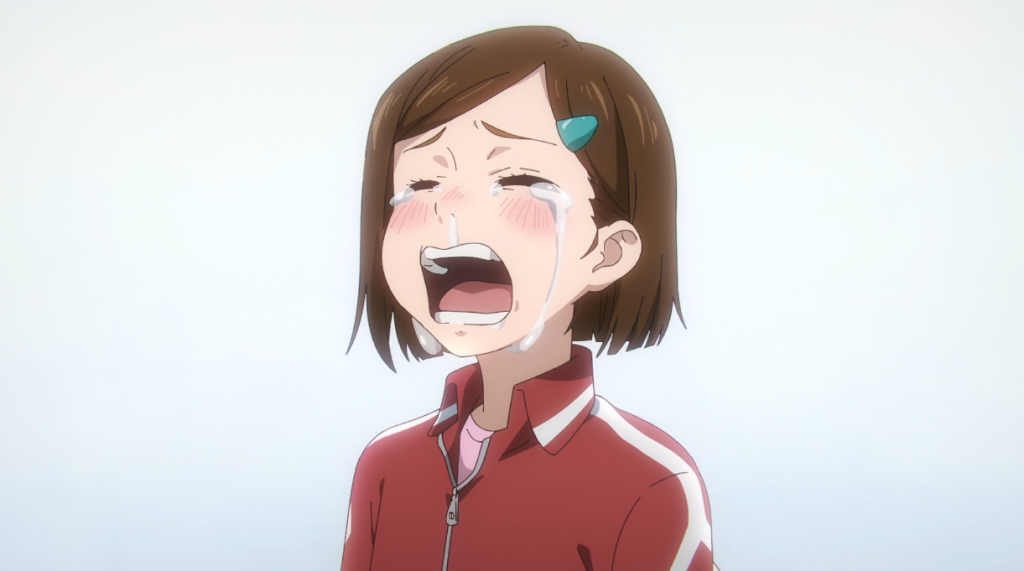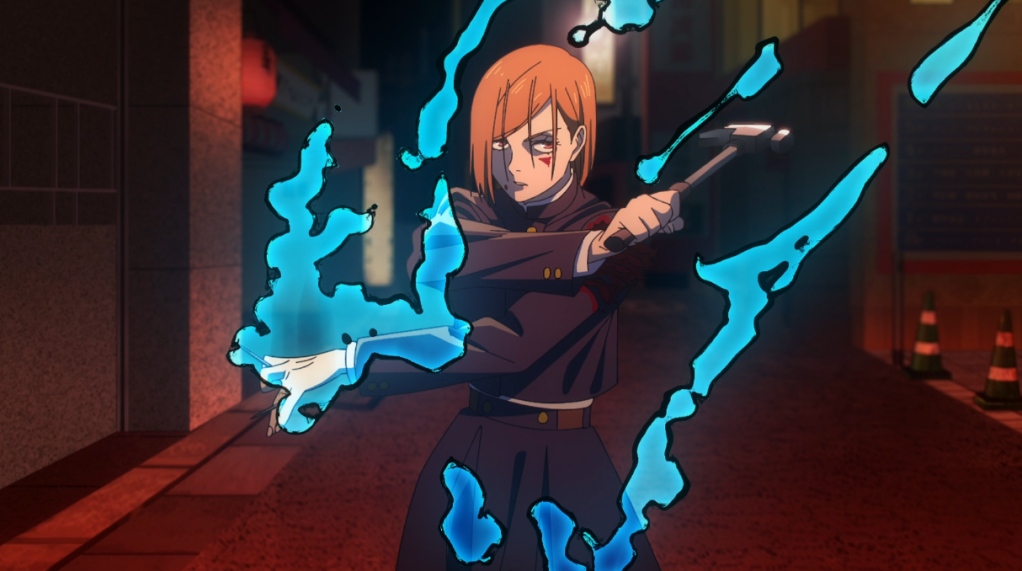Before you begin to read, please allow me to inform you that there are spoilers ahead for the anime adaptation of Jujutsu Kaisen up to episode 43. I tell you this because, unlike the lawless land of Twitter where...
Before you begin to read, please allow me to inform you that there are spoilers ahead for the anime adaptation of Jujutsu Kaisen up to episode 43. I tell you this because, unlike the lawless land of Twitter where the social contract of posting about weekly shows with some semblance of awareness that many people have lives and can’t watch new episodes immediately when they come out has been left in tatters by the need to chase clout, this blog values preserving your individual experience with a show.

Since last Thursday, I have been doing a good amount of thinking about how Jujutsu Kaisen‘s 43rd episode killed off Nobara Kugisaki, a character who at least to some degree up to this point had been presented as the third in the main trio of making up the heart of the show (although arguments can and have been made about how she is treated relative to the other members of said trio, Yuji Itadori and Megumi Fushiguro).
Personally, I was not much emotionally effected. I knew it was coming (thanks to insistence of Elon Musk’s Twitter on showing you posts from people you do not follow) and I had also seen snippets of the scene (thanks to the same, and also the erosion of the social contract I referenced in unnecessary length in the intro to this post). Had that not been the case, though, I think my reaction would have been roughly the same due to how unceremoniously Nobara is offed. Unless you were the type to find a painfully rote flashback, which is for some reason narrated by a side character who appears to only exist for the purpose of telling us information about Nobara wholly unrelated to anything else happening in the midst of the sound and fury of the Shibuya Incident arc and another character who appears to be meaningful to Nobara but we’ve never seen before, meaningful for reason, her death lacks any sort of weight or substance. And I like Nobara.


In fact, the way that Nobara is killed is such a stereotypical example of the classic fridging trope (you know, where a character [usually a woman] is killed in the story to provide some form of motivation for another character [often the protagonist, usually a man]) that I found myself checking my calendar to see if we hadn’t been transported back eleven years into the pass where conversations about fridging were abundant because the trope was so ever-present. Hadn’t we left this kind of shoddy writing in the past?
But no! exclaim the Jujutsu Kaisen faithful! There is no sexism or bad writing to be seen here! This is simply the brutal reality of Jujutsu Kaisen! It is Gege’s way, they say, with the arrogance befitting the oddly casual way they refer to the original mangaka. After all, we have also recently seen the demise of fan favorite Nanami, notably a man. Plus, there was that volcano cursed spirit, who perishes after an epic fight with Sukuna. Oh, yeah, and the two high school girls who are simply trying to get their beloved Satoru back get a very ignoble death. Not to mention the guy who was Mechamaru, and some other cursed spirits that get exorcised. This is what the Shibuya Incident arc is all about; it is following the famous writerly advice of “killing your darlings.”

Maybe they are right. Maybe the glut of violence and death is simply the nature of Jujutsu Kaisen, which already showed that it’s… checks notes not afraid to murder an innocent girl who had been destined to serve as the reincarnation of some jujutsu sorcerer semi-deity or something. Hell yeah, anyone is fair game. Brutality is the name of the game, and any character who survives ends up gets their dose of trauma.
I recall another show that wasn’t afraid to kill its character, even eager to do so. Its name, which has not been uttered in many years, was Akame ga Kill! Perhaps Akama ga Kill! was slightly more delighted to dance in the rain of its characters’ blood, slightly more joyous in its celebration of violence and eagerness to prove it didn’t give a **** about putting your fave’s decapitated head on a stake (yes, I’m still bitter) than Jujutsu Kaisen. I remember, in the wake of losing my favorite pink-haired character, writing a desperate essay pondering whether Akame ga Kill! was perhaps a refutation of the pointlessness of violence (?).
But then, too, the show’s defenders reveled in the fact that Akame ga Kill! didn’t care about your feelings about its characters. At least, unless your favorite character was the titular Akame or Esdeath, predecessor of Honkai: Star Rail‘s Kafka (or Tatsumi, I guess), you could probably expect them to die in a way that made you feel a bit sick. Very cool. Very edgy.


I’ve gotten a bit off track. Back to Nobara.
What is interesting about Jujutsu Kaisen‘s decision to knock off the only female member of its main trio (technically I have not yet made an accusation of sexism here, by the way) is how Nobara’s death relates to what I’d call the “unspoken contract” between writer and reader. While a writer can presumably do anything in their story, stories still work in certain ways that audiences have come to expect.
For instance, say you were to put a girl in the orbit of the main protagonist of your story, along with another guy. And say, based on her proximity to the other two, you created an expectation that these three characters were the core of your story—maybe even to the point that they were its heart. Then, imagine you were to mostly sideline this character during the most consequential arc of your story, have her nearly die, and then bring her back only for her to be immediately killed, with the murderer doing so with the explicit intent of creating a sort of motivation for another member of that trio.

What, exactly, is an audience to think about that? Are they to think that you’ve beguiled them with an illusion based on the expectations they’ve developed as a result of the story’s structure? Are they to see this as a clever inversion of convention and applaud? Or might they feel a little betrayed that someone who by appearance seemed a key part of the story ends up discarded, with little real attention? And what might this situation—an incident, you could even call it—do to the audience’s trust in the author’s future invitations to invest themselves into the work, world, and characters again?
Because the reality is that to bring an audience along, an author most offer something up in return for the audience’s attention. They must construct an almost Faustian-like deal in which they and the audience participate in equal measure, which gives the audience a reason to care. The author offers the work and its contents, and the audience offers, to varying degrees, their heart.


What has Jujutsu Kaisen done with its audience’s heart by killing off Nobara in the manner it did? What is the precise nature of the contract made between author and audience? And, most importantly, is the audience’s trust in Jujutsu Kaisen fulfilling its end of the contract still intact? In a fandom context where characters so often reign supreme above all else, can the audience still believe that they can and ought to care?
Whether it intended to or not, Nobara’s death has invited all these questions to the forefront. I think I know my answers. I’m curious what the answers of others are.







